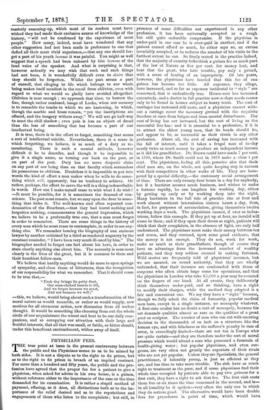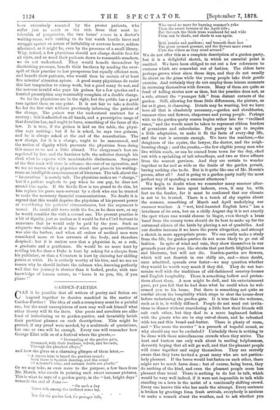PHYSICIANS' FEES.
qHE true point at issue in the present controversy between . the public and the Physicians seems to us to be missed by both sides. It is not a dispute as to the right to fix prices, but as to the right to fix prices in breach of an implied contract. For more than a hundred and fifty years, the public and the pro- fession have agreed that the proper fee for a patient to give a physician, when asked for advice in his own house, is a guinea, without reference either to the importance of the case or the time -demanded for its examination. It is rather a stupid method of payment, effacing, as it does, all distinctions both as to the im- portance of the relief desired and as to the reputations and engagements of those who listen to the complaints ; but still, in presence of some difficulties not experienced in any other profession, it has been universally accepted as a rough but still quite endurable compromise. If the physician is under-paid in one case he is over-paid in another, and if the patient cannot afford so much, he either says so, an excuse invariably accepted, or he reduces the number of his visits to the furthest extent he can. So firmly seated is the practice indeed, that the majority of country-folks think a guinea fee as much part of the law of Nature as five per cent. for money lent, and hear that the great, who hate trouble, pay only a pound, with a sense of hearing of an impropriety. Of late years, however, the physicians have fancied that this fee of one guinea has become too little. All expenses, they allege, have increased, and so far as expenses incidental to " style " are concerned, that is undoubtedly true. House-rent has increased excessively, and a doctor in full practice now-a-days needs rooms only to be found in houses subject to heavy rents. The coat of carriages has increased still more, and a physician cannot with- out a carriage cover the necessary ground with the requisite freedom at once from fatigue and from mental disturbance. The cost of living has not increased, but the cost of living as the successful live has ; and it is essential to a profession, if it is to attract the ablest young men, that its heads should be, and appear to be, as successful as their rivals in any other profession. Above all, the cost of saving has increased with the fall of interest, until it takes a frugal man of to-day nearly twice as much money to produce an independent income as it did his grandfather. Dr. Brown could have made 7 per cent. in 1700, where Dr. Smith could not in 1878 make a clear 4 per cent. The physicians, feeling all this, perceive also that their chief men are, on the whole, not quite keeping step in success with their competitors in other walks of life. They are ham- pered by a special difficulty,—the customary social arrangement of time. There are only twenty-four hours in a day for anybody, but if a barrister secures much business, and wishes to make a fortune rapidly, he can lengthen his working day, either by getting up early or by working deep into the night. Many banisters in the full tide of practice rise at four and work almost without intermission sixteen hours a day, thus, in fact, for purposes of accumulation, giving themselves twelve working days a week. The physicians cannot, if ever so indus- trious, follow this example. If they get up at four, no invalid will come to them; and if they open their doors at night, patients will think that their complaints, in the absence of light, are only half understood. The physicians must make their money between ten and seven, and they contend, upon some good evidence, that the money is not enough. They do not, work for work, make as much as their grandfathers, though of course they have an advantage from the increased number of wealthy patients, and they very seldom succeed in making fortunes. Wild stories are frequently told of physicians' incomes, but we are assured, on sound authority, that they are wholly unfounded, that their incomes are confounded with those of surgeons who often obtain large sums for operations, and that the physicians in London who take /5,000 a year may be counted on the fingers of one hand. At all events, they deliberately think themselves under-paid, and so thinking, have a right to modify their charges, while the method they adopted is a fair and convenient one. We say they have a " right " because, though we fully admit the claim of humanity, popular medical men have, except in a single instance, no monopoly whatever. A first-rate oculist has no doubt a sort of monopoly, because his art demands qualities almost as rare as the qualities of a great poet or sculptor. The number of men who can cut with unerring decision to the thousandth of an inch on a structure like the human eye, and with blindness as the sufferer's penalty in case of error, is exceedingly limited—there are not ten in Europe who are quite certain—and they are therefore under the sort of moral pressure which would attend a man who possessed a fountain of health-giving water ; but popular physicians, and even sur- geons, are very often not greatly the superiors of their rivals who are not yet popular. Unless they are Specialists, the general practitioner, if tolerably young, is just as efficient as they are, and has time to take more trouble. The rich have as much right to treatment as the poor, and if some physicians find their whole time occupied by patients able to pay two guineas for a first visit, they have a right to ask that fee. The first visit costa them five or six times the time consumed in the second, and is— in all humility be it spoken—very often the only one in which they do serious good. The alternative would have been double fees for precedence in point of time, which would have
been excessively resented by the poorer patients, who suffer just as much as the rich from that most in-
tolerable of purgatories, the two hours' seance in a doctor's
waiting-room, with nothing to do but watch hostile faces and struggle against an access of irritability or nervous horror, seldom alleviated, as it might be, even by the presence of a small library. Why, indeed, a few physicians should not charge double fees for all visits, and so weed their patients down to reasonable numbers, we do not understand. They would benefit themselves by diminishing pressure, benefit their brethren by sending the over- spill of their practice to less prosperous but equally efficient men, and benefit their patients, who would then be certain of at least five minutes' attention apiece. A good many physicians do resist this last temptation to scamp work, but a good many do not, and the nervous invalid who pays his guinea for a few queries and a hurried prescription may reasonably complain of a double charge.
So far the physicians are in the right, but the public has a good case against them on one point. It is not fair to take a double fee for the first visit without previously informing the patient of the change. The guinea was the understood contract for a century ; this is admitted on all hands, and a prescriptive usage of that duration has, and ought to have, something of the force of the law. It is true, if the guinea is laid on the table, the physi- cian says nothing ; but if he is asked, he says two guineas, and he is always asked at the end of the consultation. The new charge, for it is a charge, ought to be announced, and the notion of dignity which prevents the physician from doing this seems to us not a little absurd. The clergyman's fees are regulated by law, and the barrister tells the solicitor through his clerk what he expects with unmistakable distinctness. Surgeons of the first rank will state in advance the cost of an operation, and we see no reason why a physician should not place in his waiting- room an intelligible announcement of his terms. The talk about the " honorarium " is merely talk. The physician makes no "charge," but if a patient neglects to pay when he can pay, he does not attend him again. If Sir Savile Row is too grand to do this, let him replace his grave man-servant by a clerk who can be trusted to make the necessary financial communications. No doubt it is argued that this would deprive the physician of his present power of considering hi s patients' circumstances, but the argument is unreal. He could still wave aside the fee, as he does now, or say he would consider the visit a second one. The present practice is a bit of dignity, just as useless as it would be for a Civil Servant to announce that he would only be paid by the year. Such an etiquette was valuable at a time when the general practitioner was also the barber, and when all orders of medical men were considered more or less servants of the body, and therefore despised ; but it is useless now that a physician is, as a rule, a graduate and a gentleman. IIe would be no more hurt by settling his fee than a Duke is hurt by asking for a cheque from his publisher, or than a Countess is hurt by claiming her shilling points at whist. He is entirely worthy of his hire, and we see no reason why he should imitate the cabmen who, knowing perfectly well that the journey is shorter than it looked, prefer, with rare knowledge of human nature, to "leave it to you, Sir, if you please !"































 Previous page
Previous page